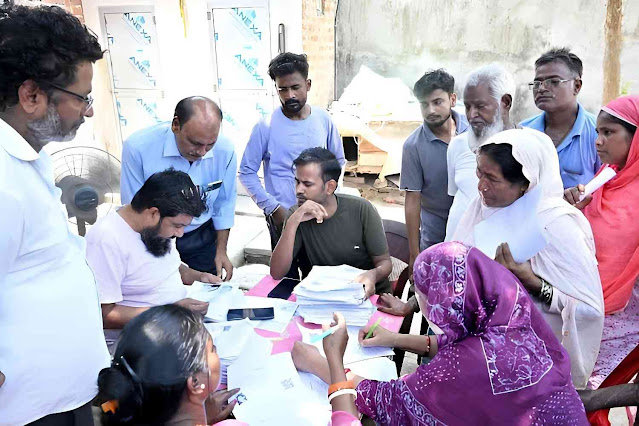 |
| Supreme Court of India issues directive on Bihar electoral roll revision 2025; live updates on Aadhaar, Voter ID, and voter rights in India |
Understanding the Context
 |
| Supreme Court of India rules on Bihar electoral roll revision 2025; political parties and Election Commission logos highlight democratic impact |
The Supreme Court's intervention came amidst rising concerns regarding an unusual revision process that was labeled as “Special Intensive Revision,” which is not explicitly recognized under existing electoral law. Traditionally, electoral roll revisions in India have either been intensive or summary. The current approach aims to address enrollments made post-2003 while imposing strict documentation requirements—primarily limiting acceptable proofs of citizenship to a list of eleven documents that notably excluded Aadhaar and voter ID cards.
Key Issues Raised by Petitioners
 |
| Citizens in Bihar submit documents for voter ID and Aadhaar verification during electoral roll revision 2025 as per Supreme Court ruling |
During proceedings, petitioners highlighted several critical issues:
- Arbitrary Exclusions: Legal representatives argued that excluding commonly held identification documents like Aadhaar and voter ID cards could disenfranchise millions. In Bihar, where poverty and lack of access to formal documentation are prevalent, these exclusions could disproportionately affect marginalized communities.
- Citizenship Verification: The core question revolves around who gets to define citizenship. While ECI maintains that Aadhaar cannot be accepted as proof of citizenship, critics assert that citizenship should not be unilaterally determined by the ECI but rather should involve broader governmental oversight.
- Timing and Practicality: With elections scheduled for November 2025, petitioners expressed concerns about the short timelines set by ECI for document submission and verification. Many voters may find it challenging to provide required documents on such short notice.
The Court’s Observations
In its ruling, the Supreme Court emphasized that the list of acceptable documents provided by ECI was illustrative rather than exhaustive. Justice Sudhanshu Dhulia clarified that while it is within ECI’s discretion to accept or reject documents like Aadhaar or voter IDs based on substantial reasons, they must also recognize that excluding widely used identification undermines democratic participation.
Three Core Concerns Identified by the Bench
 |
| Supreme Court of India exterior view as landmark verdict directs ECI to accept Aadhaar, voter ID for Bihar electoral roll revision 2025 |
- Powers of ECI: The court acknowledged ongoing debates about whether ECI has overstepped its mandate with respect to defining citizenship criteria.
- Procedural Fairness: The methodology employed by ECI in undertaking this revision process raised eyebrows among legal experts who suggest that it deviates from established practices without adequate justification.
- Timeliness: The court pointed out that deadlines for feedback and finalizing electoral rolls appear too stringent given the upcoming elections—a factor that could jeopardize voter inclusion.
Implications for Democracy
This ruling is pivotal for several reasons:
- Accessibility: By acknowledging Aadhaar and other commonly held identification forms as valid documentation for voter registration, the court promotes greater accessibility within the electoral process.
- Voter Rights Protection: Upholding citizens’ rights to vote is fundamental to a healthy democracy; thus, any barriers placed before eligible voters must be scrutinized heavily.
- Electoral Integrity: Ensuring a fair and inclusive electoral roll reinforces public trust in democratic institutions—essential for a functioning democracy.
Conclusion
 |
| Supreme Court of India building in New Delhi, central to Bihar electoral roll revision 2025 verdict on Aadhaar and voter ID validity |
The Supreme Court's directive represents a significant turning point in Bihar’s electoral landscape. It opens up crucial discussions about how we perceive citizenship documentation and voter rights in India—a nation striving toward an inclusive democracy. As we move closer to elections, all eyes will be on how effectively the Election Commission incorporates these directives into their processes while ensuring no eligible voter is left behind due to arbitrary documentation requirements.
This case serves as a reminder of our collective responsibility toward fostering an inclusive political environment where every voice counts and every vote matters—an essential cornerstone upon which our democracy stands firm.
#SupremeCourtIndia #BiharElections2025 #ElectoralRollRevision #AadhaarVoterID #VoterRightsIndia #ElectionCommission #IndianDemocracy #KingIndianMedia
Tags
News
